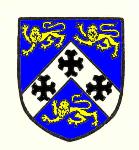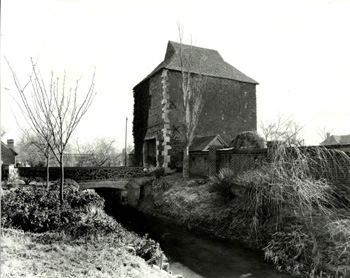The Supposed Treason of Richard Fowler

Fowler family coat of arms
Richard Fowler, Lord of the Manor of Tilsworth was arrested for high treason in 1599, implicated in a plot to poison Queen Elizabeth I. He was tried before the Court of Star Chamber in April 1600. The following document, was transcribed in 1960 by Professor Thomas G.Barnes. The spelling of the document has been modernised for ease of reading.
"This day [12th June 1600] was heard at large the matter of information preferred into this honourable court by Edward Cooke, esquire, Her Majesty's Attorney General, against Henry Boughton, gentleman, Leonard Gascoigne, William Eynes and Marie Fowler, the wife of Richard Fowler, gentleman, touching a practice and conspiracy against the said Richard Fowler wherewith the defendants were charged as by the same information at large appeareth. Upon the hearing whereof, it appeared very manifestly to this honourable court that the said Richard Fowler was heretofore apprehended and committed to the Tower of London for high treason upon a letter which by indirect means, being a forged and counterfeit letter, was brought to the hands and knowledge of the right honourable the Lords of Her Majesty's Privy Council, seeming to have been written to the said Richard Fowler to endanger Her Majesty's most royal person and likewise Sir Robert Cecil, knight, Principal Secretary to Her Majesty, whereby the said Richard Fowler notwithstanding his innocence therein, was brought in question for his life and must have stood to his trial therein had not the Queen's Majesty of Her Highness' most abundant grace and mercy remitted the course of justice in that and like courses upon true information given to Her Highness by the said Lords of Her Majesty's Privy Council, who had examined the manner and means of the publishing and falsehood of the same letter, whereupon the said Richard Fowler was enlarged and set at liberty without any further trial".
"And it did likewise manifestly appear to this honourable court, that the said Richard, having taken to wife the said Marie about eight years since, the said Marie since her said marriage hath carried herself somewhat lightly and wantonly in frequenting the company of the said Eynes in unfit and immodest sort to the great and manifest offence of her said husband, seeking by very indirect means and practices with the said Eynes and by the privity and consent of the said Henry Boughton, her brother, to separate herself from her said husband's society and company to prevent the purport of the sentence and act made in the ecclesiastical court for the reconciliation of the said Richard Fowler and his said wife; upon which ground of light behaviour appearing to this honourable court by the confessions of the defendants themselves, and as also by divers letters written betwixt the said Marie and the said Eynes and by divers other circumstances of their demeanours and carriages of themselves, the court was absolutely resolved that the said Eynes for his ungodly and unlawful liking towards the said Marie did very falsely and lewdly conspire and practice the making and publishing of the said false and forged letter wherein the said Eynes combined to himself the said Gascoigne, being of his acquaintance and both soldiers, with the privity and consent of the said Marie Fowler to put in execution the same conspiracy upon some pretence or hope of reward to be given to the same Gascoigne".
"Whereupon as it likewise appeared to this honourable court this day the same Gascoigne plotted by what means he might best publish the same false and forged letter with most colour of truth. And to that intent on the eleventh day of August last [1599] associated to himself one Samuel Hardy of Barnards Inn in Holborn, whom he purposed to use as an instrument to testify his proceedings, intending to conceal his lewd practice, not making the same Hardy any way acquainted with his lewd purpose, wherein the said Gascoigne took such a course for the effecting of his damnable practise as followeth".
"First, after the said composed letter was made and forged and conveyed into a portmanteau ["portmantua"] bought and made here in London very secretly betwixt the lining and leather thereof the same portmanteau was secretly conveyed and laid under the mat of a bed in the house of one William Brookes in Clerkenwell by a man as yet unknown but supposed by the said Gascoigne to be called Owen, a very notable traitor to Her Majesty and her kingdom, thereby to give the more colour to the supposed treason of the said Fowler. And thereupon the said Gascoigne pretending to the said Hardy that he had special occasion to go towards Bedlam [Bethlehem Hospital, for the mentally ill] near Bishopsgate London on the eleventh day of August last entreated the said Hardy to accompany him, and by confederacy beforehand betwixt the said unknown person and the said Gascoigne the same unknown person stood against a brick wall at Clerkenwell in the field there in the way where the said Gascoigne pretended to pass on his journey towards Bedlam as aforesaid. Whereupon the said Gascoigne accompany with the said Hardy passing by the said stranger, the same Gascoigne saluted him and spake unto him, thereby to let the said Hardy understand he knew the same person. Which done, the said Hardy enquiring what he was, according to Gascoigne's expectation, Gascoigne answered, it was one Owen, a very great enemy to the state and a notable traitor. Thereupon the same Hardy, requiring the said Gascoigne to apprehend the same person, the said Gascoigne forbade him in any wise not to meddle with him but to dog him whether he went and thereby some great matters might be disclosed out of his confederates, the same Gascoigne went after the said nicknamed Owen the same Gascoigne staying in the fields until his return. Which supposed Owen hid himself from the sight of the said Hardy (as it seemed) letting the same Hardy pass by him, and then returned by the said Gascoigne into the fields and departed out of sight. Then returned the said Hardy immediately, and declaring he could not see the said unknown person, Gascoigne told him that he was returned back that way by him. Whereupon the said Hardy pressing the said Gascoigne very earnestly to pursue and apprehend the same supposed traitor, no, said the said Gascoigne, it must needs be that he lodgeth in some house near hereabouts and we will go make some inquiry after him".
"And so going from the field into Clerkenwell the said Gascoigne pointing to the said Brookes his house, told the said Hardy they would inquire for the same unknown person; and being come into the house, it was confessed that a man of the constitution then described by Gascoigne lay there the night before, and was lately in the house and gone abroad. Then, said Gascoigne, bring us to the chamber where he lay. And so soon as they came hither, immediately he required one of the house to search whether he had left nothing under his bed; which was done and nothing found. But the said Gascoigne, foreknowing that the portmanteau was there, lifted up the mat under the bed with his own hands and there the portmanteau was found. And thereupon the same Gascoigne the more to colour his vile and lewd practise, persuaded the said Hardy top leave his portmanteau there in safety and not to meddle therewith until they might procure Mr.Topcliffe, or some other, to make further search in the same house. But finding that Mr.Topcliffe was not in town, the said Gascoigne persuaded the said Hardy that he might acquaint one Gilbert, then servant to the right honourable the Lord Cobham [Henry Brooke, 11th Baron Cobham, imprisoned for his part in a plot against James I in 1603], therewith. And thereupon the said Gascoigne and Gilbert repaired to the said Lord Cobham and gave him intelligence thereof, and what they had seen. Upon which intelligence given to his lordship, the said Lord Cobham immediately and very carefully sent the said Gilbert to make diligent search in the said house but found nothing but the same portmanteau , which the said Gilbert brought to his lordship. But Gascoigne and Hardy coming near his lordship's house tarried still behind and did not go in to his lordship, who immediately searched the portmanteau , and finding nothing there but certain lining, redelivered the portmanteau to Gascoigne and Hardy as a matter of no regard".
"Then the same Gilbert, meeting again with the said Gascoigne, Hardy and reporting to the that his lordship found nothing of importance in the portmanteau, they went together into a tavern where the said Gascoigne, Hardy and Gilbert, taking unto them the same portmanteau seeming to make better search in the same and immediately thrusting their hands where the said Gascoigne knew the letter lay, as also a certain little glass with supposed poison in it, and a small Agnus Dei [literally Lamb of God, a name for Jesus Christ and shown as a lamb carrying a banner; this was probably to imply Roma Catholic motives for the plot, suggesting that Fowler may have been a Catholic] which were likewise conveyed unto the same place to give the more colour to the said practise, drew forth the same and shewed them to the said Gilbert, who forthwith returned therewith to the said Lord Cobham, the said Gascoigne and Hardy still tarrying behind for that the said Gascoigne feared to be betrayed in his lewd and wicked practise".
"Upon all which matters the court hath judged that the said letter was contrived, forged and made by the wicked plot and conspiracy of the said Gascoigne and Eynes with the privity and assent of the said Marie Fowler with an intention to endanger the life of the said Richard Fowler, and that therefore the said Gascoigne, Eynes and Marie Fowler shall be committed to the Fleet [prison] and the said Mary Fowler from thence after some reasonable time of imprisonment to be committed to Bridewell [prison]. And that the said Gascoigne, being the principal offender in the execution of the said practises and conspiracies. shall be carried on horseback with his face to the horsetail to the pillory at Westminster, where he shall stand with a paper on his head declaring his offence; and shall in like manner be carried to Cheapside and stand on the pillory there likewise some day in the term time with a like paper, and shall also pay for a fine to the use of Her Majesty a thousand marks [£666/13/4]. And that the said Eynes for his offence shall be set upon the pillory in Cheapside and at Westminster with a like paper declaring his offence, and shall pay for his fine to the use of Her Majesty the like sum of a thousand marks. But touching the said Henry Boughton, forasmuch as there appeared no sufficient matter to the court whereby they might be led to convict him of the said conspiracy, therefore he is discharged thereof. Nevertheless, for that it appeared to the court that he kept company with the said Eynes, and for that he did in some sort complot and practise how his said sister might live apart from her said husband contrary to the intent and to the preventing of the act or sentence pronounced and made in the ecclesiastical court, therefore he is ordered to be committed to the Fleet and to pay for a fine to Her Majesty's use likewise a hundred pounds, and to become bounden with sufficient sureties in the sum of five hundred pounds to be of good behaviour henceforth".
 Tilsworth Manor Gatehouse 1969 [Z50/124/3]
Tilsworth Manor Gatehouse 1969 [Z50/124/3]